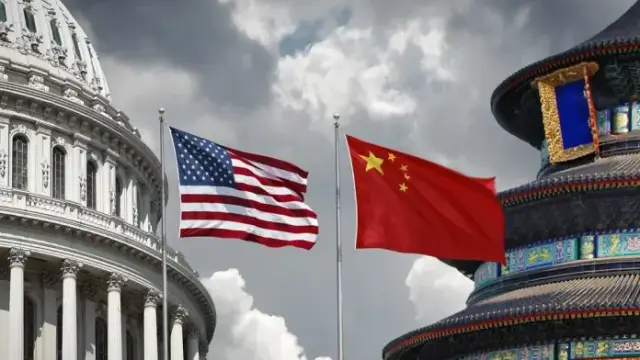The trade conflict between the U.S. and China is increasingly resembling an MMA-style showdown. President Donald Trump has revealed a 100% tariff on Chinese imports, while President Xi Jinping has imposed a nearly 100% ban on critical minerals exported to the U.S. This escalation highlights a central issue: the victor will be the nation that secures dominance over critical minerals mining supply chains and the innovative energy derived from these resources.
Critical minerals and the rapidly evolving renewable energy sector that relies on them are vital for achieving global leadership in artificial intelligence, strengthening national defense, fostering innovation, supporting urban growth, and managing rising electricity costs. To counter China’s influence and triumph in this trade war, the U.S. must expedite energy production. This necessitates a governmental approach that allows fossil fuels, renewables, and other advanced mineral-dependent energy sources to compete without favoritism.
BIDEN’S CHIEF OF STAFF GAVE MOST DAMNING TESTIMONY YET IN AUTOPEN PROBE
Some may refer to this as an all-of-the-above energy strategy. However, interpretations of this strategy differ significantly between the political Left and Right. For some, it implies incorporating renewables and nuclear energy into our energy mix, while for the far Left, it suggests excluding fossil fuels entirely.
What is needed is a comprehensive energy strategy that combines the best elements of both renewable and traditional energy sources, crafted in America. This approach should mitigate the risks associated with over-reliance on any single resource, technology, or country.
The Trump administration is already actively promoting American energy, yielding results. Natural gas production is at all-time highs, and the U.S. leads the world in oil production. Additionally, the administration is making strides to secure critical minerals, crucial as China controls over 80% of the processing of these minerals.
To enhance energy output further, the government must eliminate bureaucratic obstacles and short-sighted policies that hinder our energy potential.
Take fossil fuels as an example. The volume of oil and gas produced is irrelevant if we cannot transport and utilize it effectively. Pipeline construction has long been impeded by frivolous lawsuits, political disputes, and complex bureaucratic processes. Which is more detrimental to the environment: a pipeline or a highway congested with tanker trucks? Pipelines can actually benefit the environment, contrary to popular belief. The CEO of Williams, an energy infrastructure firm, recently stated that securing permits for one of his company’s pipelines costs twice as much as constructing the pipeline itself.
Moreover, past administrations allowed the U.S. industrial base to erode and relocate to countries with lower labor costs, such as China. As a result, GE Vernova currently faces a three-year backlog for orders of gas turbines that convert natural gas into electricity.
Oil and gas are not the sole energy sectors suffering from governmental mismanagement.
Policymakers have permitted China to effectively monopolize the rare earth production market. Critical minerals are essential for battery storage technology, electric vehicles, solar panels, and the entirety of the renewable energy industry, where China also holds a dominant position.
The Trump administration is working to rectify this strategic error by recently securing a multi-billion-dollar, long-term agreement to revive the Mountain Pass critical mineral mine in California. However, while federal subsidies may attract attention, it’s essential to recognize how government actions can stifle mineral extraction.
Innovative companies like Lilac Solutions are pioneering direct lithium extraction methods. Traditional lithium mining is resource-intensive, requiring substantial water, land, and time. The direct lithium extraction process currently being developed in Utah’s Great Salt Lake utilizes leftover brine water, including wastewater from oil and gas production, along with ion exchange to significantly reduce the inputs needed for lithium extraction.
Despite its minimal environmental impact, any industry associated with “mining” faces heavy regulation in the U.S. The high costs and uncertainties stemming from government bureaucracy render innovations such as direct lithium extraction risky for the private sector, especially when companies recognize they are just one environmental lawsuit away from collapse.
Internationally, alternative sources of critical minerals, such as those found in nodules on the deep seabed near the Cook Islands, could provide the U.S. access to polymetallic sulfides and cobalt without extensive land disruption. However, excessive environmental regulations hinder our ability to sustainably access these alternative sources, perpetuating our reliance on China and more ecologically damaging mining methods.
TRUMP HAS BEGUN ASIA TRIP WITH MAJOR TRADE DEAL AND OPENNESS TO MEETING KIM JONG UN
The free market has a remarkable ability to generate abundance, and energy is no exception. Currently, however, America’s minerals and energy sectors are constrained by ineffective policies and government red tape.
It is not the government’s role to choose winners and losers, particularly by over-regulating certain industries while allowing others to flourish. Our leaders should implement fewer and more effective regulations, enabling the private sector to excel in developing and delivering the most abundant, affordable, reliable, and clean energy solutions. Only then can America surpass China.
Drew Bond is the co-founder, president, and CEO of C3 Solutions.
 Telegram is where we really talk. Don't miss out!
Telegram is where we really talk. Don't miss out!








